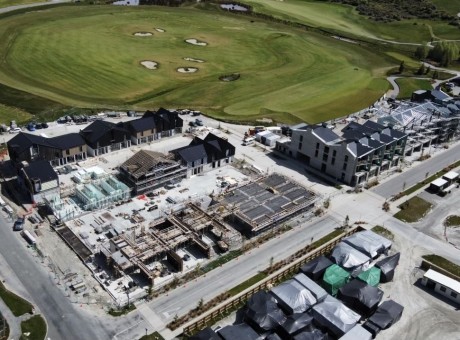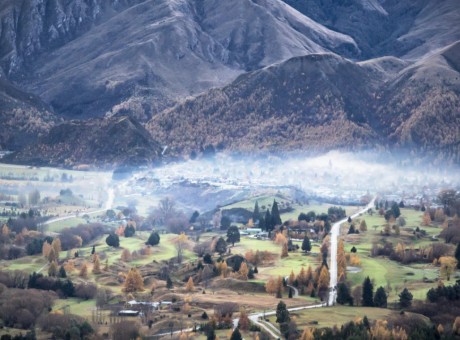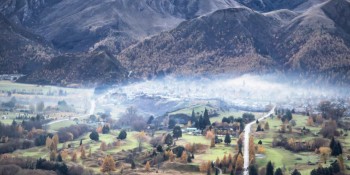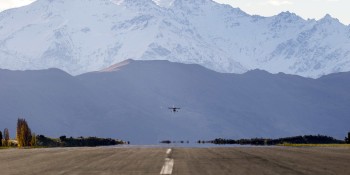Degrowth: is this where capitalism comes to die?
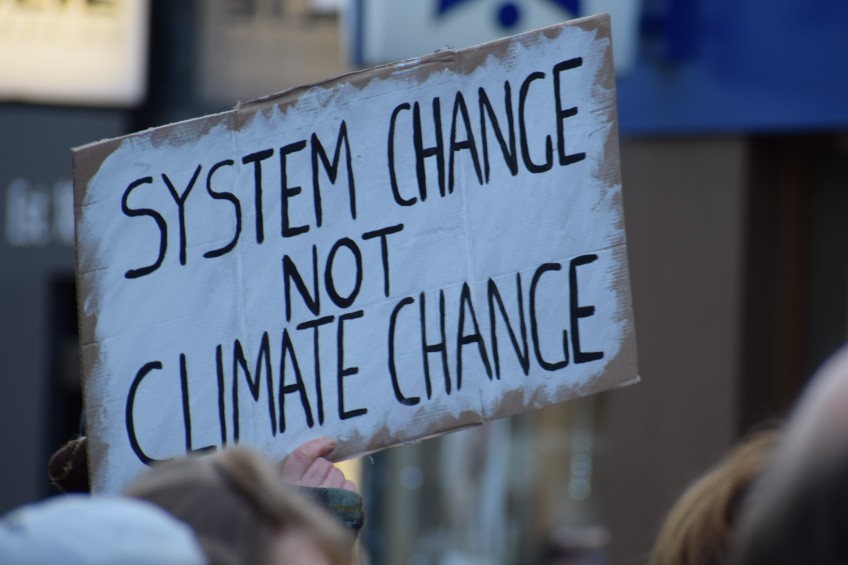
The fifth annual Wao summit is fast approaching. Much like our climate crisis. We've teamed up with @Wao Aotearoa to dig deeper into what really needs to change, peeling back the reality of climate action. Georgia Merton from Wao dives into degrowth, one of the summit's key themes this year.
Could less be more? This is an exploration of a bold new future. It’s chunky, so grab a cuppa.
About 400,000 years ago, on the Kenyan plains where some of our first ancestors lived, things got a bit crazy. Early humans had been happily getting by with the technology of the day (stone hand axes), when, according to findings from a 2020 archaeological study, the lake beds all dried up. There was intense volcanic activity, too, and most of the large herbivores, which these early Homo relied on to eat, all but disappeared.
Instead of being wiped out, fossils and artefacts from the time show that these early humans emerged from this crisis with portable, more compact obsidian blades, some which could even attach to wood and become spears. Moral of the story? You can probably see where I’m going with this - humans are capable of co-operating and undergoing badass levels of change in response to a changing environment.
In case you weren’t already drowning in climate change news, we’re kind of in dire straits right now. We are heading towards a temperature rise of 3.2 degrees Celsius within this century. According to researcher and Chair of Victoria University’s School of Government, Jonathan Boston, we have until 2050 to halve the raw materials that we use to avoid total ecological collapse. “That’s about a generation,” Boston points out. It’s a tall order - but then so was surviving a drought which wiped out all our food.
And whilst the ecological crisis can feel overwhelming and way too big, and it’s so very tempting to shove our noggins back in the sand and wait for it to be over, there are solutions being proposed, new futures being imagined. One of these is a movement called ‘degrowth’. It’s about as anti-establishment as you can get - as one degrowther put it on LinkedIn, it’s actually punk as fuck.
So what does degrowth mean?
There are different schools of thought (and policy positions) within the degrowth movement, and it is nuanced and complex. But overall, it’s a radical response to the radical challenge that we collectively face. According to Boston, degrowth states that we need to drastically reduce overall consumption of natural resources (both renewable and non-renewable) and reduce energy consumption to stay within planetary boundaries.
Degrowth is essentially a challenge to the great mantra of capitalism: that is, that eternal growth means success. Under degrowth, as Jason Hickel, author of the book Less is More: How Degrowth will save the world, explains, we learn to do more with less. We use our legs over our cars, we eat differently, we make our lives simpler. We redistribute wealth and prioritise social and ecological well-being over a rising GDP. Rather than austerity, Hickel writes, ‘degrowth calls for abundance in order to render growth unnecessary.’
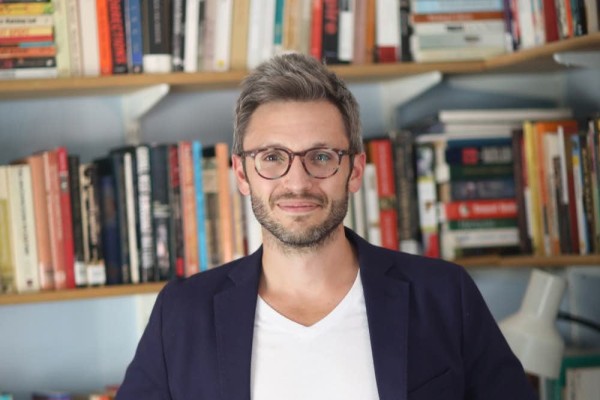
Jason Hickel: We learn to do more with less, we use our legs over our cars, we eat differently, we make our lives simpler (Image Facebook/Jason Hickel).
But why would we need to do that? We have technology - green technology! We can replace all our fossil fuel-derived energy with renewables and keep going as we are, right? With keep-cups and electric vehicles and big electric planes? Well, not exactly. This solution, which has come to be known as ‘green growth’, is sexy, so it has quickly been adopted as a mainstream narrative. Under a green growth model, economic growth can continue, just within planetary boundaries. But a widening number of researchers are poking holes in the green growth story, and suggesting we write a new one.
Boston is one such researcher, as is Hickel. Integrated energy systems researcher Tim Crownshaw joins them. “Almost all the environmental impacts we can quantify are correlated with growth,” Crownshaw, who is based at Victoria University, BC, Canada, points out. “To continue with growth and reduce these impacts down is still completely fictional.” Crownshaw says that while we can and should convert to renewables to a certain extent, this can’t sustain life as we know it.
So there’s a green vs degrowth debate going down; there’s a bit to it, but stay with me. There are a few things the two approaches have in common. Many people, degrowthers and green growthers alike, are in agreement now that Gross Domestic Product (GDP) is a lousy measure for human prosperity. It measures production capacity. As Robert Kennedy famously said in 1968, it “Measures everything in short, except that which makes life worthwhile.” Hickel, who is a professor in global inequality, political economy and ecological economics, writes 'If you cut down a forest for timber, GDP goes up. If you extend the working day and push back the retirement age, GDP goes up.'
Furthermore, as retired social psychologist, CEO and philanthropist Dr. Jack Santa Barbara says in a conversation on the Lentil Intervention Podcast, GDP does not take into account costs, such as those associated with climate change. “You couldn’t run a business that way, and yet we run our economies only counting economic activity and not the cost associated with that activity,” Santa Barbara says, “And I’m just talking about dollar cost, never mind the other value issues that go way beyond.”
So advocates for both green growth and degrowth agree that we should de-couple GDP growth with environmental degradation. But, as Hickel points out, though we could feasibly reduce emissions through conversion to renewables whilst continuing to grow the economy, it’s a matter of speed. Most renewables have much lower energy returns than fossil fuels, and that process will be slow. We have seven years, Hickel reminds us, to cut our emissions in half.
Aside from that small matter, reducing emissions whilst growing the economy under the green growth model would mean throwing all our other planetary boundaries under the bus. More growth means more material extraction and more biodiversity loss. And, at the end of the day there’s been a lot of talk about green growth over the years, but our fossil fuel use is still increasing and we’re rushing headlong towards multiple planetary tipping points.

Keep cups and electric vehicles - a green growth solution has quickly been adopted as a mainstream narrative, but a widening number of researchers are poking holes in the green growth story, suggesting we write a new one (Image Facebook/KeepCup).
Degrowth is basically calling for us to stop fucking around. It's a revolution of epic proportions, one which imagines an utterly new future. It's not a recession, but a large-scale restructure. Most strands of degrowth state that we’re running out of resources fast, so we may as well have a strategic plan in place for getting better at using less. Kind of like an addict controlling their detox, to avoid the pain of going cold turkey.
The approach doesn’t necessitate that GDP goes down, but it suggests a major shift in focus - and that human beings can thrive without it rising. Indeed, some countries have started this shift: Bhutan prioritises Gross National Happiness as a measure over GDP, whilst at home in Aotearoa, our well-being budget attempts to take into account more holistic metrics for societal well-being. But as a global population, we remain chained to economic growth, and as Boston says, “A commitment to continued GDP growth is likely to bring forward the point at which humanity will face collapse in current civilization.”
So yeah, it’s pretty serious. Like, apocalyptically serious. And yet we keep on keeping on. Probably because there’s been no real alternative to capitalism considered, and because it seems to have worked, in a way. There’s some faith in the system - it’s what has raised the standard of living and given us technology and flourishing enterprise and general human development, right? Not entirely. Before we start imagining a new and different future, it’s probably wise to explore some hard truths about capitalism:
First, a quick clarification. As Hickel explains, markets, trade and business are innocent enough. What distinguishes capitalism, though, which only actually came onto the scene 500 years ago, is that it is dependent on endless growth. If it doesn’t grow, it collapses. And to grow, it must be inherently extractive. That is, it relies on the exploitation of nature and people; it needs to use more than it gives back.
And this extraction has not benefited all equally. There is the common story that capitalism has generated wealth and raised the standard of living for everyone, that it has ‘raised all ships’, so to speak. But as Hickel explains in Less is More, spreading from Europe through colonisation across the developing world, capitalism was made possible only by the extraction of natural resources and forced labour from the global South. The capital gains, of course, went straight to the global North. As he writes, ‘Britain didn’t develop India. India developed Britain.’
This has only made the global North richer, whilst historically keeping the global South underdeveloped - though this is of course a blanket term, and there are large variations within developing countries. As of 2020, CO2 emissions per capita for a New Zealander is 6.8 (metric tons), compared to 0.6 for someone living in Bangladesh. This is the basis of climate injustice, and as Hickel explains, the economies of the developed world massively overuse energy and resources, but still fail to meet human needs. This is because they are set up to serve capital profit, rather than people. Wealth gaps are only getting wider, something which the Spinoff explains brilliantly in this Side Eye graphic.
Hickel is not the only one to point out that this one-sided Western paradigm is unjust, as well as illogical. So while it’s the system on which we’ve built life as we know it, the whole capitalism story ain’t really what it’s cracked up to be. As Charles Eisenstein writes, ‘We sense that ‘normal’ isn’t coming back, that we are being born into a new normal: a new kind of society, a new relationship to the earth, a new experience of being human.’ It’s time to imagine something better. And like our badass ancestors with their tool-sharpening strokes of wisdom, we too are capable of change.
Okay, so what would degrowth actually look like?
Terms like GDP growth and extraction are useful, but they can be kind of abstract. So what might it look like if the economy stopped growing, on the ground here in Aotearoa? It is definitely a scary thought. Hickel emphasises that it doesn’t need to be - that degrowth is not economic contraction but a coherent policy to reduce ecological impact and improve well-being.
Crownshaw says there are two main degrowth camps, which basically outline our two main options: do we contract the economy as an intentional political act (Hickel’s degrowth), or is this an emerging set of circumstances that we will have to deal with? That is, will we do it on our own or will we be forced into it by our changing world?
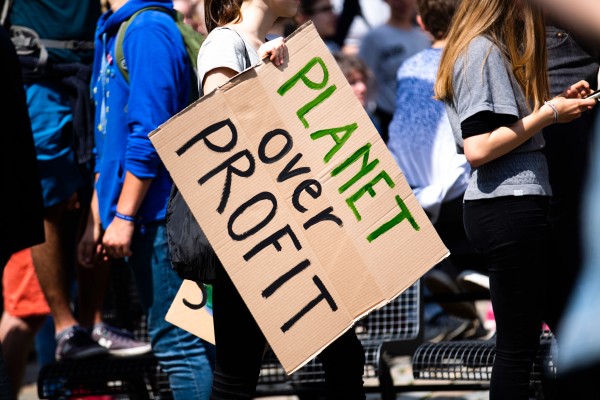
Is a post-growth world inevitable? And what does living within planetary boundaries look like? (Image supplied Wao).
Either way, whether prepared and intentional or kicking and screaming, Crownshaw says a post-growth world is basically inevitable. So what does living within planetary boundaries look like, and how do we prepare for that shift in a way that rebalances social equity? According to Boston, it will require massive changes to living standards and lifestyles in the global North which the vast majority of people have no awareness of. Let’s break it down:
Transport: “It would mean a dramatic reduction in international aviation, unless we can get very low emission aircraft,” says Boston, “Much international aviation would need to cease. We would have to reduce our vehicle fleet and shift it from being fossil fuel based to being almost exclusively electric.” For the speed of change required, he says we’d need to stop the purchase of new internal combustion vehicles right now. “People would need to move to car sharing, active transport and public transport.”
Food: “We would need to move predominantly to vegetarian diets with much reduced consumption of meat and dairy,” says Boston. “So plant-based diets - globally as well as locally.”
Land use practices: Boston says we’d need to radically de-stock and allow for the regeneration of bush. “We’d need to move away from extensive dairying,” he says, “And move back to what we had 30 years ago, which was mixed farming and cropping.”
Clothing: “We would need to move to a much greater reliance on clothes made from natural fabrics and move away from fast fashion,” Boston says.
But doesn’t a slowed economy mean more unemployment? While Crownshaw warns of the very real risk that comes with disrupting financial systems and employment. Both Hickel and Boston put forward re-imaginings of a new working world. “It would be an economic experiment,” Boston says, “Four day working weeks, work sharing more generally - a measure to shift towards a planned economy,” says Boston. Hickel writes that without policies to prevent mass employment (like shorter working weeks, job guarantees and retraining programs), it’s not degrowth.
And what about the global South?
A key aspect of the degrowth movement, and one which has attracted pushback, is that while the global North reduces wasteful energy consumption, the global South should be allowed to grow to achieve the living standards they have been denied. Crownshaw explains that the first increments of growth are very beneficial to all countries. “Life expectancy, employment, information, electricity - there’s still around 2 billion people that still don’t have access to reliable electricity,” he says. “Those early steps towards growth and development are not something we in the global North should be denying those in the global South.”
Having said that, he’s sceptical that politically, this would ever get across the line. “That those of us in the overdeveloped countries would reduce consumption to make room for this?” He says, “From a game theory and geopolitical point of view - I don’t think it’s going to happen.”
And herein lies the biggest, very real challenge to the degrowth movement:
Politics.
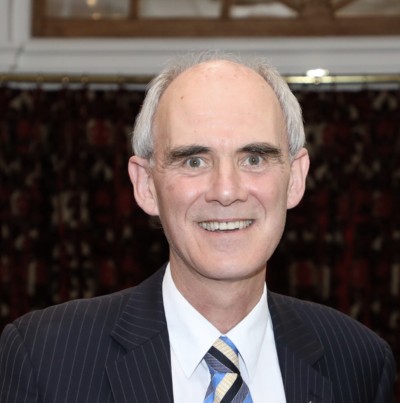
Chair of Victoria University’s School of Government Professor Jonathan Boston says we have about a generation to halve the raw materials that we use to avoid total ecological collapse.
You can’t tell people what to do in a democratic society, especially when the outcomes are uncertain. Boston, for one, wishes politicians and policy makers would make more noise about the gravity of our situation and the magnitude of change required. “Most people simply do not understand,” he says.
But trying to get people to give up their job, their holiday and their car? To even attempt this, for many, would be political suicide. Look at the division caused by vaccinations. “This presents one of the greatest challenges to democracy that we’ve ever faced,” Boston says, and indeed critics of degrowth have pointed out that politics may well be the demise of this approach - its handbrake, when speed is crucial.
“There are glimmers of hope,” Boston says. “California, for example. They have recently decided that people will not be able to buy combustible vehicles after 2035. This is too late, but it’s a beginning. New Zealand is a laggard in this regard.”
Crownshaw belongs to the less optimistic second camp of degrowthers, and thinks we won’t take pre-emptive policy steps. “We’re probably looking at a situation where we’re forced into degrowth. There is a midway, a shift of focus towards non-growth related metrics of success in a society, like Bhutan’s GNH and NZ’s wellbeing budget,” he says. “I do think we’ll see more attention to that middle ground. It hits a wall at some point, though, and will start to see the effects of economic contraction on the financial system.”
What happens then, Crownshaw says, is unknown. He thinks policy makers are rightfully very hesitant - there are a lot of dangers, pitfalls and uncertainties. It becomes, then, a question of psychology and behaviour change. How much can we question our current tightly held norms and beliefs and start to imagine something different? Could those in the developed world warm to the idea that less is more, after years of artificially cheap energy and resources?
Crucially, as Hickel explains, we stop adhering to artificially created scarcity. Could we vote for leaders who enforce wealth redistribution, encourage investment into social capital, and prepare us for a post-growth future?
While Crownshaw is on the less hopeful side for what will force us into changing, he’s optimistic about what might happen on the other side. We might be like the early, post-drought humans, out the other end clutching more sophisticated tools. “If we manage to do it in a relatively controlled way, I think we’ll end up with more sustainable livelihoods by necessity,” he says. “Not as much disposable income, less gadgets and goodies. But globalisation has in a way fractured society. People go where the jobs are, and that has led to loneliness and mental health issues.”
Crownshaw, along with other degrowth advocates, thinks we could find ourselves in a better world. “A more human economy, a more ecologically-aware economy,” he says. “We will be forced into simpler lives, in much closer unity with our local environments.”
Sounds like a more beautiful world. And as Crownshaw says, we’re not going to get there by buying electric cars - we’ll get there by downscaling.






